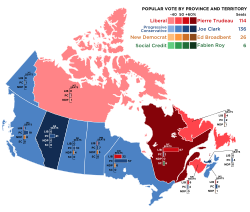Canadian federal election, 1979
|
|
|||||||||||||||||||||||||||||||||||||||||||||||||||||||||||||||||||||||||||||||||||||||||||||||||
|
|||||||||||||||||||||||||||||||||||||||||||||||||||||||||||||||||||||||||||||||||||||||||||||||||
|
|||||||||||||||||||||||||||||||||||||||||||||||||||||||||||||||||||||||||||||||||||||||||||||||||
|
|
|||||||||||||||||||||||||||||||||||||||||||||||||||||||||||||||||||||||||||||||||||||||||||||||||
| Popular vote map showing seat totals by province | |||||||||||||||||||||||||||||||||||||||||||||||||||||||||||||||||||||||||||||||||||||||||||||||||
|
|||||||||||||||||||||||||||||||||||||||||||||||||||||||||||||||||||||||||||||||||||||||||||||||||
Joe Clark
Progressive Conservative
The Canadian federal election of 1979 was held on May 22, 1979, to elect members of the Canadian House of Commons of the 31st Parliament of Canada. It resulted in the defeat of the Liberal Party of Canada after 11 years in power under Prime Minister Pierre Trudeau. Joe Clark led the Progressive Conservative Party to power, but with only a minority of seats in the House of Commons. The Liberals, however, did beat the Progressive Conservatives in the overall popular vote by more than 400,000 votes.
The Trudeau Liberals had become very unpopular during their last term in government because of broken promises to the left made in the previous election. Although elections in Canada are normally held four years apart, Trudeau deferred calling an election until five years after the previous election in the hope that the Liberal Party would be able to recover some of the support that it had lost. The effort was unsuccessful, however, and the Liberals lost 27 seats due to the resulting vote splitting on the left. Several high-profile cabinet ministers were defeated, and the Conservatives were elected in what was a sort of an accident of protest. Trudeau resigned as Liberal leader following the election.
...
Wikipedia




